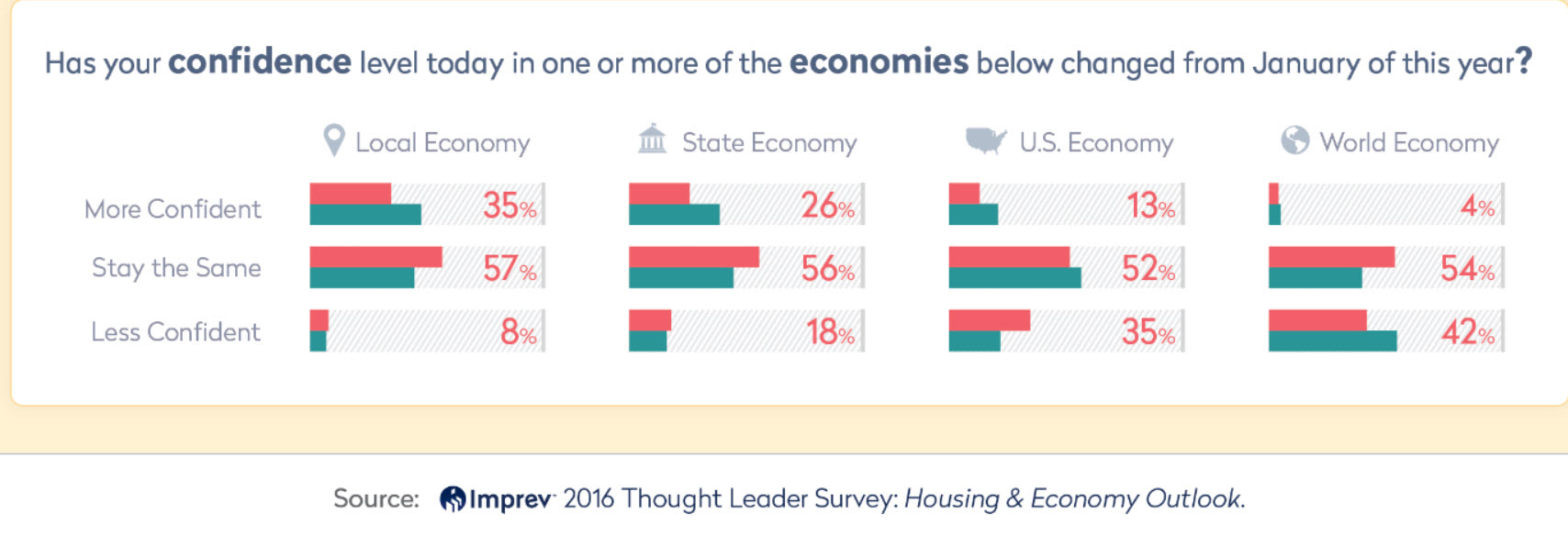
Top real estate executives’ confidence in the U.S. economy and housing market for 2017 has softened compared to two years ago, and 42 percent have grown less confident in the world economy since January, according to the latest Imprev Thought Leader Real Estate Confidence study.
Respondents included nearly 240 broker-owners and top executives at leading franchises and independent brokerage firms, making Imprev’s study one of the most comprehensive in real estate. This group was responsible for more than half of all U.S. residential real estate transactions last year.

“Real Estate leaders are clearly less bullish about the coming year than they were two years ago,” says Renwick Congdon, Chief Executive Officer of Imprev, a top provider of automated marketing services for real estate. “In fact, confidence for 2017 is lower across nearly all questions related to housing and the economy.”
“When we compare past studies, an interesting trend emerges: Executives and broker-owners are less confident in the global economy and far more confident in their local economies at the end of each year than they were at the beginning. In fact, their confidence grows stronger the closer the economy is to home,” Congdon explains. “This year, while only 4 percent of leaders say their confidence in the world economy has grown this year, 35 percent say their confidence in their own local economy has grown; while 13 percent have gained confidence in the U.S. economy, 26 percent have more confidence in their own state’s economy.”
Study key findings:
- 2015 vs. 2017 U.S. Economic Outlook – Real estate leaders are split in their view of the economic outlook for 2017: 30 percent think it will improve and 23 percent believe that it will deteriorate. 44 percent think the U.S. economy will stay the same, while 2 percent think it will “improve significantly” and 1 percent believe it will “deteriorate significantly.” One Midwest broker-owner noted he is most concerned with “keeping agents productive no matter what the economy does.” Looking back at Imprev’s 2014 study responses, this year’s outlook is less hopeful. In 2014, 45 percent of study participants said they thought the U.S. economy would improve (compared to this year’s 30percent). This year, the number of executives who believe the U.S. economy will deteriorate next year more than doubled, moving from 9percent in 2014 to 23 percent. One Southwestern broker-owner shared his negative view bluntly: “It is the economy, stupid,” he commented.
- 2015 vs. 2017 Housing Demand Outlook: Leaders are less bullish on housing next year compared to their outlook for 2015. Nearly half (47 percent) of study participants thought housing demand would improve in 2015, and now just over one-third (35 percent) think housing demand will improve in 2017. The number of those who believe housing demand will deteriorate in 2017 has doubled to 13 percent from 6 percent for the outlook for housing demand in 2015.
- 2015 vs. 2017 Housing Market Confidence: Overall, the vast majority (74 percent) of real estate executives and broker-owners are “somewhat confident” in the housing market for 2017. That’s down from 79 percent from the Imprev study two years ago. While 5percent of leaders are “not at all confident” in the housing market in 2017 – up from 3percent in 2015 – 21 percent are “very confident” in the housing market for next year, and that is also up from 18 percent in 2015. A broker-owner of a major franchise office pointed to three reasons for his tempered enthusiasm: “Low inventory, slow development and a lack of new home construction.”
- 2015 vs. 2017 Brokerage Profitability Confidence: Two years ago, 43 percent of real estate leaders responded that they were “very confident” that their brokerage business would be more profitable in 2015. But the percentage of those who are very confident in greater profitability has fallen to 39 percent for 2017. A larger regional broker-owner, who runs an office of more than 1,000 agents, identifies rising costs as a major concern. “It is about expenses versus shrinking profits,” she said. Moreover, 12 percent of real estate leaders said they are “not at all confident” that their brokerage business will be more profitable next year, more than double the percentage – 5percent –from two years ago.
Agents may be getting younger, but leadership average age is getting older: Despite the agent population getting younger (average age of a Realtor is 53 years old in the latest NAR study, down from 57 years old in 2014), the leadership population in real estate is getting older: In the 2014 Imprev study, 88 percent of broker-owners and executives were over 40 years old. In this new study, 92 percent are over 40 years old, while more than 36 percent are over the age of 60 (up from 2014’s 32 percent). A move towards younger agents is creating other challenges for brokerages. A Minneapolis and St. Paul broker-owner wrote, “While recruiting younger, less experienced agents has improved for us this year, we have noticed increased difficulty in recruiting the top talent.” The owner of a boutique brokerage in Southern California added her biggest challenge in 2017 is “developing managerial depth.”
The annual Imprev Thought Leader Real Estate Confidence Survey, which debuted in 2012, was developed by Imprev to provide insight on key business challenges top executives face, encouraging an exchange of ideas and solutions among industry thought leaders.
The study was conducted from October 18 to November 1, 2016. 15 percent of the respondents represented firms with more than 1,000 agents; 17 percent represent firms with 501 to 1,000 agents; 42 percent represent firms with 101 to 500 agents, and 26 percent represent firms with 100 agents or fewer.





